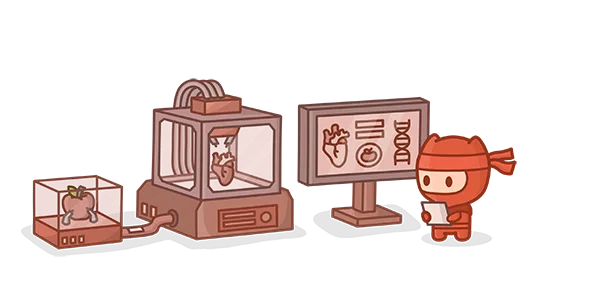
Exploring for Possibilities
Dominant Aspects
If humans were computers, our dominant traits would be the operating system that is embedded and hard-coded in our minds. These deeply ingrained behaviors run on autopilot, driving our every action without conscious thought. Like breathing or blinking, we can actively choose to control our actions with enough concentration. However, most of the time, our recurring behaviors seem to be driven by our subconscious, functioning effortlessly and instinctively.
Instinct is a marvelous thing. It can
neither be explained nor ignored.
Agatha Christie
Dominant traits are often mistaken as strengths in most other personality systems. But here in Personality Ninja, we hold a different view. To us, traits are just traits, shaped by the wiring of our cognitive functions. Whether a trait is good or bad largely depends on the way it is used. As such, these traits can either be the source of one's greatest strengths, or the cause of their biggest downfall.
Naturally, we will hone our dominant traits, refining them into our super strengths. However, if we are not careful, there is a chance that we may push our dominant traits into overdrive, manifesting them in very unhealthy ways. In the end, our dominant traits are our natural tendencies and nothing more. The key to harnessing them effectively lies in knowing when, where, and how to use them.
Oftentimes, an idea may seem impossibly complex, but Trailblazers always have it figured out. Their clever minds can recognize the connections between different ideas, noticing the patterns that others often miss. This grants Trailblazers more perspectives, enabling them to have more opportunities to develop an accurate understanding. Hence, they are always seeking to uncover the truth, as knowledge only comes to those who dare to explore the unknown.

Though great at figuring things out, Trailblazers are terrible at understanding social dynamics. They tend to omit others from their decision-making process, preferring to go full steam ahead with their own plans. This creates conflict as their ideas often clash with people’s interests. Their dismissive attitude paints Trailblazers as condescending and arrogant, repelling those who come too near.
Without realizing it, Trailblazers might end up living in a daydream. Their tendency to dismiss feedback causes them to have a subjective understanding of reality, where fictitious ideas are often mistaken for the truth. And when their logic is questioned, they might stubbornly insist on their flawed reasoning. Such Trailblazers may think that their analytical ingenuity alone is enough to solve the world's problems. But in reality, they are merely fools trying to move mountains on their own.
From Buddhism to the Big Bang, humans have always been forming new theories to explain the unknown. Trailblazers are at the forefront of this innovation, constantly creating frameworks to answer life's biggest mysteries. But as problems become more complex, so must the solutions. Hence, Trailblazers are always improving their frameworks, ensuring that it provides them accurate answers every time.

However, some of their frameworks might not actually be applicable. They may try to fix their methods by adding more caveats, but the truth is, a conceptually flawed idea can never be made to work. Trailblazers who do not realize this may be reluctant to give up their frameworks, even after they have been proven wrong. Stuck in this mindset, they may not be able to learn anything new, as their perception would always be clouded by their own faulty logic.
At their worst, Trailblazers could become excessively attached to their frameworks, holding on to them as if they are sacred scriptures. They may insist on using their own methods over everything else, sometimes doing so without any contemplation. They then justify their actions with elaborate excuses, pointlessly arguing with others, unaware that in reality, they might be the ones who are blind to reason.
Dyson spheres, time travel, cryopreservation. Some of the questions in life have no immediate answers. Trailblazers tackle them by dissecting each and every aspect of the matter, examining the underlying theories that make it work. This allows them to easily identify the possible flaws it may contain. Thus, Trailblazers ensure that the conclusions they make are logically sound, leaving no room for ambiguity.

Having said that, Trailblazers tend to fall into a vicious spiral of analysis paralysis. They excessively search for flaws in an idea, demanding for it to have an extreme level of accuracy. This hinders progress as they cannot move on from even the tiniest amount of logical ambiguity. However, what they do not realize is that their actions are ironically irrational. Because in reality, no matter how hard one tries, no human can categorically determine the absolute truth.
Taken to the extreme, Trailblazers may wind up becoming overly judgmental people—looking for faults even in places where there are none. In their minds, this action would be seen as perfectly reasonable behavior, but the truth is that they are only looking at the glass half empty. This pessimism will breed further negativity, trapping Trailblazers in a cycle of discontent with their lives.
Behind every great idea lies a foundation of solid principles. Thus, to better understand life's enigmas, Trailblazers are constantly updating their principles to accurately reflect reality. They do this by exploring various new theories and beliefs, integrating its underlying concepts into their personal tenets. With every new idea they take in, they get one step closer to the truth, uncovering the many mysteries of life.

Though Trailblazers may see their principles as accurate and precise, others often do not. The problem lies in the fact that Trailblazers form these tenets solely by themselves. They seldom consider external opinions or critique. As such, it comes as no surprise that these tenets are only true to them, and them alone. When an idea is validated by only a single person, it is nothing but a personal opinion.
Taken to the extreme, Trailblazers might fail to see how self-centered their principles truly are. Influenced by their subjective worldview, Trailblazers may develop flawed principles that become a convenient justification for their actions. For a tenet to be truly transformative, it has to apply to humanity as a whole. If Trailblazers fail to realize this, they will eventually grow to be egocentric, careless of how their actions affect the people close to them.
To wrap it up, dominant traits are neither our strengths nor are they our weaknesses. They are simply traits we tend to exhibit naturally in our daily lives without much realization.
The biggest reminder here is this: a trait is a trait. It is a unique characteristic of an archetype, each carrying its own pros and cons. With that understanding, let us now venture into the next set of traits that we do more consciously—our supportive traits.
Read next section →
Supportive Traits [Trailblazer]